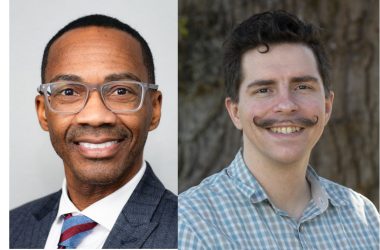Salem voters on Tuesday overwhelmingly rejected the city’s plan for a payroll tax, with 82% voting no.
The tax was intended to address the city’s budget deficit. Without it, city leaders will spend the next few months seeking money elsewhere and making deep cuts to balance the budget.
The public vote came after the Salem City Council narrowly passed the tax on July 10 in a 5-4 vote, after a public hearing where most citizens spoke against the tax. After the vote, those in favor said they believed it would prevent impactful cuts to community services and that they would not have the time to convince voters to approve the measure in a campaign, while those opposed said they wanted the tax brought before voters first.
On July 14, the statewide business group Oregon Business & Industry filed a petition to refer the tax to the ballot which gathered thousands of signatures by August to put it before voters in the Nov. 7 special election, where it was rejected.
The morning after election night, Salem Reporter emailed each city councilor, the mayor and the city manager with two questions: What is the message from Salem citizens you see in the results? And, how will you act on that understanding?
Police Chief Trevor Womack and Fire Chief Mike Niblock, whose departments would have seen the majority of payroll tax funds, declined to respond to questions about the impact of the vote on their departments, referring questions to City Manager Keith Stahley.
Stahley, Mayor Chris Hoy and councilors responded via email. Their answers are below, lightly edited for typos.
City Manager Keith Stahley
“Fortunately, we have already started those discussions with City Council over the past several months at our council work sessions. Staff are planning on presenting Council with a process to explore revenue options with the community for council’s consideration on November 27, 2023. Through this process, we hope to learn more clearly what our community might support to increase funding so we may retain vital services. In parallel with that work, we are planning to amend our current year budget in February 2024 to reduce spending and services and will be formulating our next year’s budget with reduced levels of funding and services reductions as presented in our recent work sessions and consistent with our revenue estimates.”
Stahley also shared a statement about the city’s fiscal situation, which included next steps the city will take. Read that here.
Staff will likely recommend that a revenue task force to explore options to raise money be created in January, said spokeswoman Courtney Knox Busch. The city’s budget committee, which includes the city council and nine citizen members, will start considering the five-year budget forecast that month.
Councilors who voted for tax on July 10
Mayor Chris Hoy
“It’s clear that, of the people who voted, they did not want a payroll tax. I’ve heard from many voters who understand that the city needs additional revenue to provide the level of service residents demand. We now have to do the work to figure out what that looks like.
We continue to explore all sources of additional revenue, including the state. It’s past time they pay for services they receive.”
Virginia Stapleton – Ward 1
What is the message from Salem citizens you see in the results?
“Firstly, I want to express my disappointment that only 30% of Salem residents chose to have their voices heard. During the last few months, I’ve seen how the extreme opinions in our community, both far-left and far-right, were speaking louder than the vast majority in the middle, those that honestly just want their government to function. But a decision to not engage is a decision of sorts. That leaves me with the only data available, those who chose to vote. The opponents to the payroll tax made it clear that additional revenue shouldn’t come from working families, and the voters agreed. Where then should the revenue come from, the business community? There also seems to be a disconnect between wanting more services and being willing to pay for those services. Our only option moving forward is cuts until the community can rally behind a new revenue option.”
How will you act on that understanding?
“The first thing we need to do is make $10 million in cuts as soon as possible. The sooner we do that the better, as finding a new revenue source will take some time. Granted, this first round of cuts only buys us six months, but I’m ready to make those decisions and take that vote. I’ve heard we’ll be starting yet another revenue task force which, I believe, will be people handpicked from an application process – I have strong doubts that this will in any way be representative of the community. Those elites will take on the task of coming up with a new plan. We must have new revenue, or the cuts will continue indefinitely.”
Linda Nishioka – Ward 2
“I am disappointed that this tax measure failed. I am grateful to the voters who participated in the democratic process. I acknowledge the importance of public participation. This does not change the need for revenue, so we will work together to find acceptable solutions to shape the future of our community.”
Trevor Phillips – Ward 3
What is the message from Salem citizens you see in the results?
“I am not surprised. Voters have spoken very clearly. Our community will not raise revenue through a substantial payroll tax.
We as council tried to fix a very large structural funding imbalance in one go. We had very few options and insufficient time to avoid making real cuts to services. This was always going to be a gigantic lift. We need a more thorough community outreach effort and better communication amongst all parties.”
How will you act on that understanding?
“Council is obligated to budget within current funding constraints, which means cuts are now unavoidable. I have referred to the pending cuts as a “smorgasbord of awful.” I still feel that way. Of course, we have to continue to maximize our process efficiencies. But the current math is clear, the city will have to scale back services every year moving forward until we find a way to fix our structural imbalances caused by measures 5 and 50.
Simply speaking, people want us to do more with less. I get that. Unfortunately, reality is that less is simply less in this case. There will be real world trade offs due to lack of additional revenue.
I am hopeful that we can all work together on future solutions. There’s a broad understanding that new revenue is needed. We will need the help of our state legislature and the governor to address unique issues that affect our capital city. We risk losing more than 250 managed shelter units in the next 18 months. I will continue working on ways to raise revenue through the revenue task force and budget committee processes that have more community support.”
Micki Varney – Ward 8
What is the message from Salem citizens you see in the results?
“Presented with the option of supporting or not supporting the payroll tax as a source of revenue to address the deficit in the city’s general fund, Salem citizens chose to cut city services rather than increase revenue.”
How will you act on that understanding?
“I’ve received direction from the voters and will do my due diligence to carry out the will of the people. The Salem community faces some seriously difficult decision making. Together, we will determine, and bear the consequences of, the choices that will be required moving forward.”
Councilors who voted against tax on July 10
Deanna Gwyn – Ward 4
Gwyn did not respond to Salem Reporter’s email by the deadline. At a south Salem town hall Tuesday night, she said the following:
“Probably the main issues that folks had with the payroll tax was it didn’t take into account everyone, so it wasn’t really equitable,” she said, and would impact people making just above minimum wage. “So we have to find something that’s equitable.”
Jose Gonzalez – Ward 5
What is the message from Salem citizens you see in the results?
“Salem spoke, their message could not have been more clear and it will not be forgotten! I am proud of them for standing up for themselves. It also showed there is at least one thing that unites basically everyone.”
How will you act on that understanding?
“Now the real work begins, I am looking forward to it. This is what I had been advocating for as Chair of the Finance Committee, earlier this year I had asked for options to cut our budget as a show of good faith to our Citizens before we even thought about asking for more revenue. I voted against the payroll tax, but here we are now in a worse position. We are still having to do the work but now with thousands of people having lost faith in the process. My goal will be to begin rebuilding trust, that is job one.”
Julie Hoy – Ward 6
What is the message from Salem citizens you see in the results?
“The voters have spoken in a big way and I am thankful.”
What is the message from Salem citizens you see in the results?
“I look forward to working together… with a dedicated task force… to address the financial issues the City is facing… to look at the situation with fresh thinking and perspective. I know this won’t be easy… but I am hopeful… and frankly relieved. We can do better.”
Vanessa Nordyke – Ward 7
What is the message from Salem citizens you see in the results?
“Never try passing a payroll tax without us again.”
How will you act on that understanding?
“Keep listening and keep pushing for a City that serves everyone.”
Contact reporter Abbey McDonald: [email protected] or 503-704-0355.
SUPPORT OUR WORK – We depend on subscribers for resources to report on Salem with care and depth, fairness and accuracy. Subscribe today to get our daily newsletters and more. Click I want to subscribe!

Abbey McDonald joined the Salem Reporter in 2022. She previously worked as the business reporter at The Astorian, where she covered labor issues, health care and social services. A University of Oregon grad, she has also reported for the Malheur Enterprise, The News-Review and Willamette Week.









